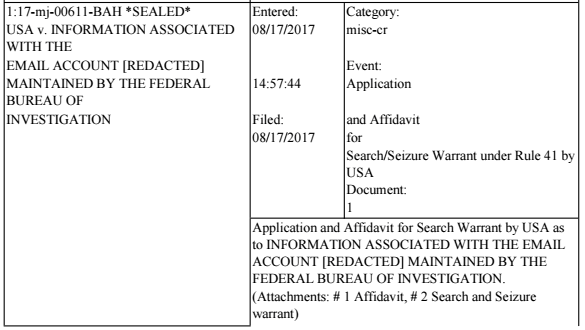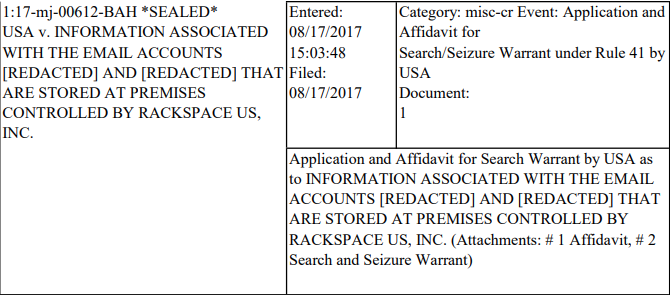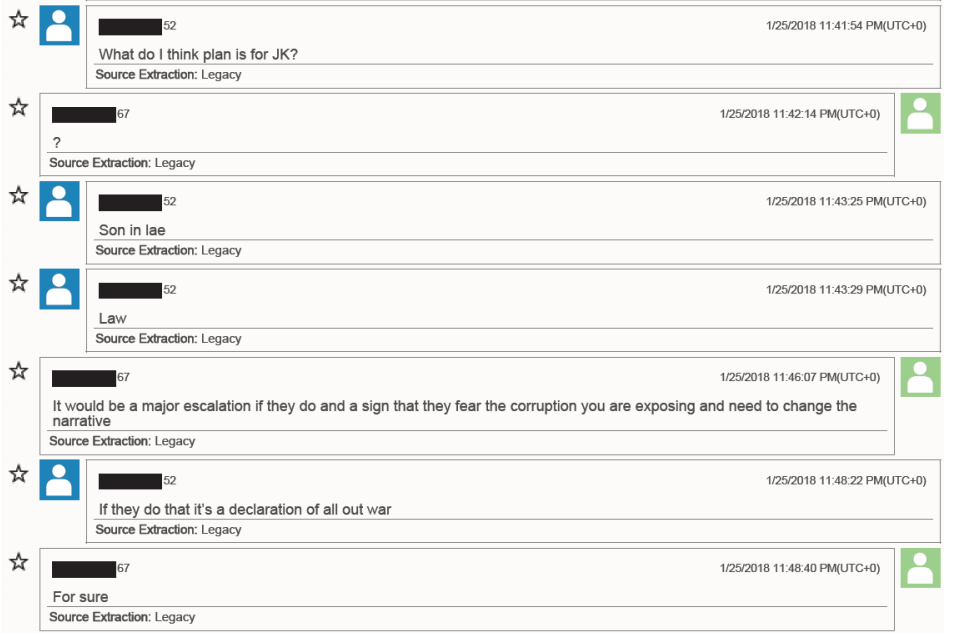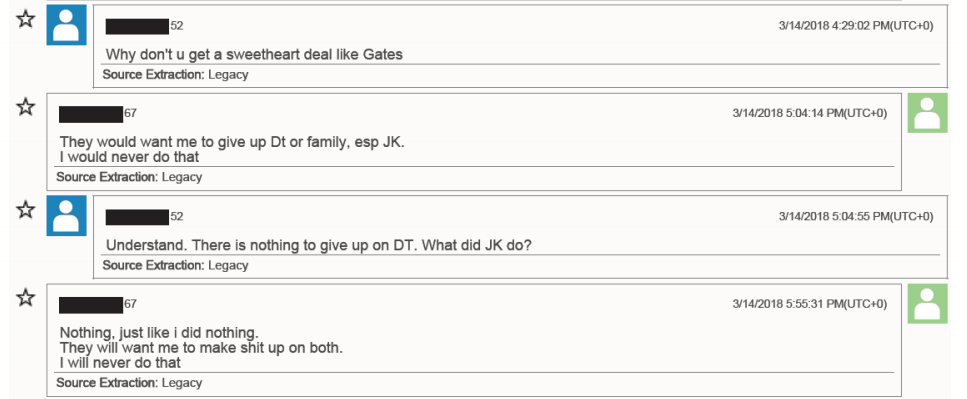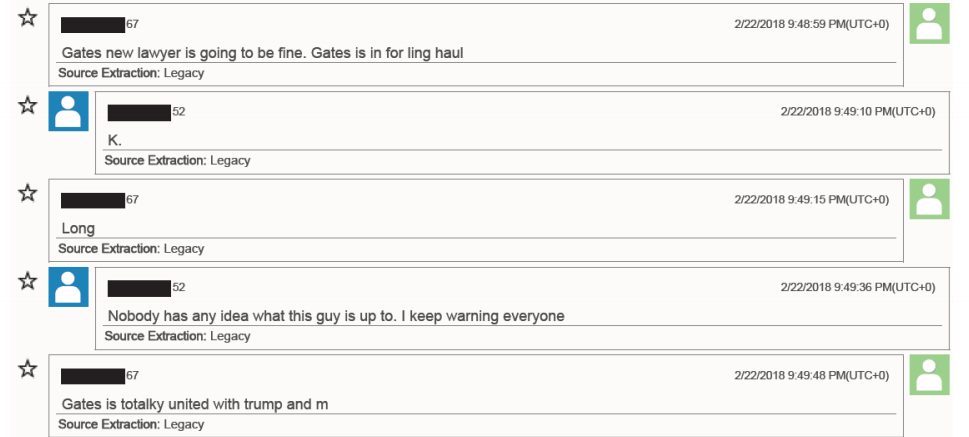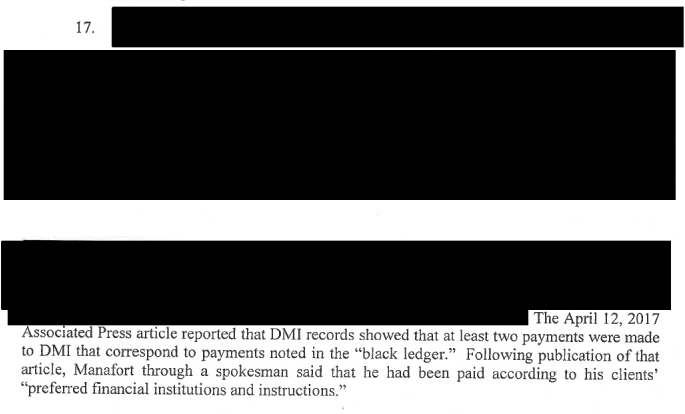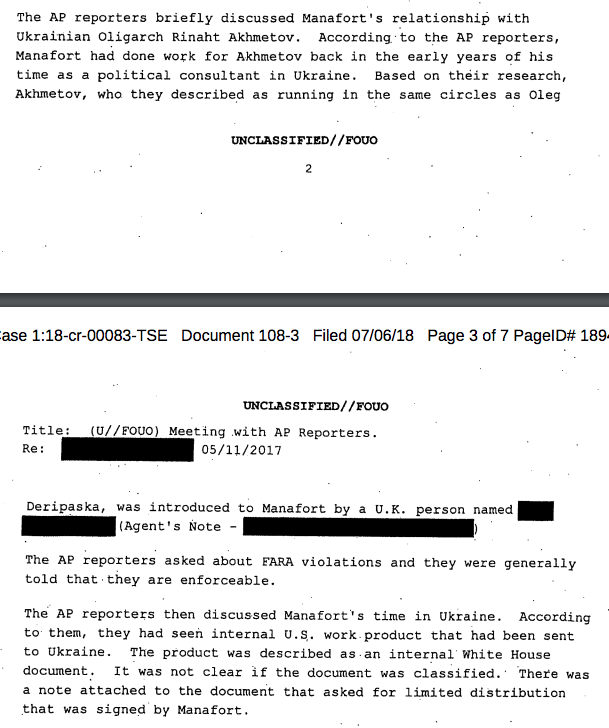If the FBI had spied on Trump’s campaign as aggressively as alleged by Mark Meadows and Jim Jordan, then Robert Mueller would have been able to determine why Trump’s campaign manager had a meeting on August 2, 2016 to discuss how to get paid (or have debt forgiven) by Ukrainian and Russian oligarchs while discussing how to win Midwestern swing states and how to carve up Ukraine. In fact, the public record suggests that the FBI did not start obtaining criminal warrants on Manafort’s election year activities until the July 25, 2017 warrant authorizing the search of Manafort’s condo, which was the first known warrant obtained on Manafort that mentioned the June 9 meeting. A mid-August warrant authorizing a search of the business email via which Manafort often communicated with Konstantin Kilimnik is probably the first one investigating that August 2 meeting (as distinct from his years of undisclosed Ukrainian foreign influence peddling).
In other words, it took a full year after the Steele dossier first alleged that Paul Manafort was coordinating on the Russian election interference operation, and over a year after he offered Oleg Deripaska private briefings on the Trump campaign, before the FBI obtained a criminal warrant investigating the several known instances where Trump’s campaign manager did discuss campaign details with Russians.
While there are definitely signs that the government has parallel constructed the communications between Kilimnik and Manafort that covered the period during which he was on the campaign (meaning, they’ve obtained communications via both SIGINT collection and criminal process to hide the collection of the former), it seems highly unlikely they would have obtained campaign period communications in real time, given the FBI’s slow discovery and still incomplete understanding of Manafort’s campaign period activities. And the public record offers little certainty about when if ever Manafort — as opposed to Kilimnik who, as a foreigner overseas, was a legitimate target for EO 12333 collection, and would have been first targeted in the existing Ukraine-related investigation — was targeted under FISA directly.
All the while Manafort was on a crime spree, engaging in a quid pro quo with banker Steve Calk to get million dollar loans to ride out his debt crisis and lying to the government in an attempt to hide the extent of his ties with Viktor Yanukovych’s party.
Similarly, by all appearances the FBI remained ignorant of one of George Papadopoulos’ dodgy Russian interlocutors until after his second interview on February 16, 2017, suggesting they not only hadn’t obtained a FISA order covering him, but they hadn’t even done basic criminal process to collect the Facebook call records that would have identified Ivan Timofeev. Papadopoulos told Congress that when the FBI first interviewed him in January 2017, they knew of his extensive Israeli ties, but the asymmetry in the FBI’s understanding of Papadopoulos’ ties suggests it may have come from spying on the Israelis rather than targeting Papadopoulos himself.
Those are a few of the details illustrated by a detailed timeline of the known investigative steps taken against Trump’s associates. The details comport with a claim from Peter Strzok that he lost an argument on August 15, 2016, about whether they should pursue counterintelligence investigations of Trump Associates as aggressively as they normally would. The overt details of the investigation, at least, are consistent with Attorney General William Barr’s May 1, 2019 observation that the investigation into Trump’s associates was “anemic” at first.
The timeline does suggest that one of Trump’s associates may have been investigated more aggressively than he otherwise might have been, given the known facts. That person was Michael Cohen, whom the dossier alleged had played a central role in negotiations with Russia and even — the last, most suspect dossier report claimed — had paid hackers.
Cohen, of course, was never formally part of the campaign.
But even there, Cohen was not under investigation yet at the time Richard Burr shared the targets of the investigation with the White House on March 16, 2017 (at that point, only Roger Stone had been added to Carter Page, Papadopoulos, Manafort, and Mike Flynn, who are believed to be the four initial subjects).
In the days after Robert Mueller was appointed on May 17, 2017, the investigation might still not have amounted to anything, even in spite of Trump’s reaction, “Oh my God. This is terrible. This is the end of my Presidency. I’ m fucked.” The next day, after all, Peter Strzok (who had been involved in the investigation from the start) said, “my gut sense and concern there’s no big there there.” And less than a month later, Lisa Page appears to have suggested to Strzok that the FBI hadn’t decided whether Agents on Mueller’s team would be able to use 702 data — something that, in normal national security investigations, Agents can access at the assessment level.
But by June 21, Mueller was investigating Cohen’s Essential Consulting bank account — the one from which he paid hush payments to Stormy Daniels — because it appeared he was accepting big payments from Viktor Vekselberg, perhaps in conjunction with a plan Felix Sater pitched him on Ukranian peace. At first, Mueller got a preservation order on his Trump Organization emails. But then on July 18 — shortly after Mueller got a preservation order for all of Trump Organization emails in the wake of the June 9 meeting disclosure — Mueller got a warrant for Cohen’s emails, which set off an investigation into whether Cohen had been an unregistered foreign agent for any of a number of countries.
The investigation into the Essential Consulting account would lead the SDNY to charge him in the hush payments. And the collection on Cohen’s Trump Organization emails — collected directly from Microsoft instead of obtained via voluntary production — that would disclose the Trump Tower Moscow plan that Trump lied and lied and lied about.
Only after Mueller started ratcheting up the investigation against Cohen did Mueller first get a warrant on Roger Stone, in August 2017. That’s one of the two investigations (the other being Manafort) that remains ongoing.
Meanwhile, every one of these targets continued to engage in suspect if not criminal behavior. Manafort went on a crime spree to hide his paymasters, stay afloat long enough to re-engage them, and in January 2017 even tried to “recreate [his] old friendship” with Oleg Deripaska. Carter Page went to Moscow in December 2016 and claimed to be speaking on behalf of Trump with regards to Ukrainian deals. Papadopoulos considered a deal with Sergei Millian worth $30,000 a month while working at the White House, starting the day after the election, something even he thought might be illegal (but about which he didn’t call the FBI). Mike Flynn continued to try to implicate Hillary Clinton in his efforts to get Fethullah Gulen arrested on behalf of his secret foreign paymasters, all while getting intelligence briefings. And Cohen moved to collect on reimbursements for the illegal campaign donations he made to silence some of Trump’s former sex partners.
This is just the public record, presented in warrant applications being progressively unsealed by media outlets in court dockets. There may be an entirely asynchronistic counterintelligence investigation conducted using intelligence authorities. Though given the FBI’s actions, it seems highly unlikely, given their apparent ignorance of key details, that’s the case.
Which is to say that the public record supports Peter Strzok’s claims that the investigation lagged what a normal counterintelligence investigation might have. And all the while the investigation slowly moved to uncover the secrets that George Papadopoulos and Mike Flynn and Michael Cohen and Paul Manafort and (allegedly) Roger Stone lied to cover up, those men continued to engage in sketchy behavior, adding more reason to pursue the investigation.
As I disclosed last July, I provided information to the FBI on issues related to the Mueller investigation, so I’m going to include disclosure statements on Mueller investigation posts from here on out. I will include the disclosure whether or not the stuff I shared with the FBI pertains to the subject of the post.
Timeline
March 2016: Start date on spreadsheet of communications between Konstantin Kilimnik and Paul Manafort (possible parallel construction, though available portions of chart do not show whether contacts include phone calls).
April 26, 2016: Joseph Mifsud tells George Papadopoulos the Russians have Hillary emails that will be damaging to her that they plan to release to help Trump.
May 6, 2016: Papadopoulos speaks to Downer aide Erica Thompson; this is the day the Mueller Report says Papadopoulos first shared news that the Russians had emails.
May 10, 2016: Papadopoulos tells Alexander Downer some of what Mifsud told him.
June 14, 2016: DNC announces Russia has hacked them.
June 15, 2016: Guccifer 2.0 claims credit for the DNC hack.
June – July 2016: Facebook provides FBI two warnings about GRU using social media to conduct an espionage operation.
July 1, 2016: Christoper Steele writes Bruce Ohr email about “our favorite business tycoon,” referring to Oleg Deripaska, part of an effort to pitch Deripaska as a source to the US.
July 7, 2016: Via email, Paul Manafort offers private briefings on the campaign for Oleg Deripaska.
July 19, 2016: Steele dossier allegations about Carter Page trip to Moscow
July 25, 2016: Stone gets BCCed on an email from Charles Ortel that shows James Rosen reporting “a massive dump of HRC emails relating to the CF in September;” Stone now claims this explains his reference to a journalist go-between. Stone emails Jerome Corsi and tells him, “Get to [Assange]. At Ecuadorian Embassy in London and get the pending Wikileaks emails . . . they deal with Foundation, allegedly.” Corsi forwards that email to Ted Malloch.
July 27: Paul Manafort struggles while denying ties to Russia, instead pointing to Hillary’s home server.
July 27, 2016: In a press conference, candidate Trump:
- Asks Russia to find Hillary’s missing emails
- Lies about having ongoing business discussions with Russia
- Suggests he may have ordered someone to reach out to foreign countries (which he seems to have done with Flynn)
- Suggests he’s considering recognizing Russia’s seizure of Crimea
Both before and after this press conference, Trump asked aides — including Flynn and Gates, and probably Stone to go find the emails.
July 28, 2016: Paul Manafort gets a refinance in exchange for a campaign position for Steve Calk; this has led to a criminal conviction for Manafort and a bribery charge for Calk.
July 30, August 1, 2016: Papadopoulos and Sergei Millian meet in NYC; Millian invites Papadopoulos to two energy conferences.
Before July 30, 2016: First Steele dossier allegation that Manafort managed cooperation with Russia.
July 30: Bruce and Nellie Ohr meet with Christopher Steele; they talk about two claims from dossier, that “a former head of the Russian Foreign Intelligence Service, the SVR, had stated to someone…that they had Donald Trump over a barrel,” and that Carter Page had met with high level Russians while in Moscow. They also discuss Oleg Deripaska’s efforts to get evidence Manafort owes him money (though not, according to Ohr’s notes, the claim that Manafort was coordinating an election-year operation with Russia) and Russian doping. Ohr passes the information on to Andrew McCabe and Lisa Page.
July 31, 2016: FBI opens investigation into Papadopoulos and others based on Australian tip.
July 31, 2016: GAI report on From Russia with Money claiming Viktor Vekselberg’s Skolkovo reflects untoward ties; it hints that a greater John Podesta role would be revealed in her deleted emails and claims he did not properly disclose role on Joule board when joining Obama Administration. Stone emails Corsi, “Call me MON,” and tells him to send Malloch to see Assange.
August 1, 2016: Steve Bannon and Peter Schweitzer publish a Breitbart version of the GAI report.
August 2, 2016: Paul Manafort meets with Konstantin Kilimnik to talk 1) how the campaign plans to win MI, WI, PA, and MN 2) how to carve up Ukraine 3) how to get paid by his Ukrainian and Russian paymasters. Corsi writes Stone, “Word is friend in embassy plans 2 more dumps. One shortly after I’m back. 2nd in Oct. Impact planned to be very damaging.”
August 4, 2016: Stone flip-flops on whether the Russians or a 400 pound hacker are behind the DNC hack and also tells Sam Nunberg he dined with Julian Assange.
August 5, 2016: Manafort puts Calk on an advisory committee. Stone column in Breitbart claiming Guccifer 2.0 is individual hacker. Page texts Strzok that, “the White House is running this,” which is a reference to the larger Russian active measures investigation.
August 7, 2016: Stone starts complaining about a “rigged” election, claims that Nigel Farage had told him Brexit had been similarly rigged.
August 8, 2016: CrowdStrike report on hack of Democrats (referred to here).
August 10, 2016: Steele dossier reports on Mike Flynn RT meeting that had already been publicly reported.
August 12, 2016: Guccifer 2.0 publicly tweets Stone.
August 10, 2016: Manafort tells his tax preparer that he would get $2.4 million in earned income collectable from work in Ukraine in November.
August 14, 2016: NYT publishes story on secret ledgers. Corsi would later claim (falsely) to have started research in response to NYT story.
August 15, 2016: Papadopoulos follows up with Sam Clovis about a September 2016 meeting with Russia. Manafort and Gates lie to the AP about their undisclosed lobbying, locking in claims they would make under oath later that fall. In response to NYT story on Manafort’s graft, Stone tweets, “@JohnPodesta makes @PaulManafort look like St. Thomas Aquinas Where is the @NewYorkTimes?” Strzok loses an argument with McCabe and Page about aggressively investigating the Trump leads; afterwards he texts Page, “I want to believe the path you threw out for consideration in Andy’s office—that there’s no way he gets elected—but I’m afraid we can’t take that risk. It’s like an insurance policy in the unlikely event you die before you’re 40….”
August 17, 2016: Trump’s first intelligence briefing. While working as an unregistered agent of Turkey, Mike Flynn accompanies Trump to his intelligence briefing.
August 17, 2016: AP publishes story on Manafort’s unreported Ukraine lobbying, describing Podesta Group’s role at length.
August 19, 2016: Paul Manafort resigns from campaign in part because he was not forthright about his ties to Russia/Ukraine.
August 21, 2016: Roger Stone tweets, it will soon be Podestas’ time in the barrel.
August 23, 2016: Sergei Millian offers Papadopoulos “a disruptive technology that might be instrumental in your political work for the campaign.”
August 24, 2016: CrowdStrike report on hack of Democrats (referred to here).
September 1, 2016: Stefan Halper meets with Sam Clovis.
September 2, 2016: Halper reaches out to Papadopoulos. Lisa Page texts Peter Strzok that “POTUS wants to know everything we are doing;” per her sworn testimony, the text is a reference to the larger Russian investigation.
September 12: Following further reporting in the Kyiv Post, Konstantin Kilimnik contacts Alex Van der Zwaan in attempt to hide money laundering to Skadden Arps.
September 13, 2016: DOJ starts inquiring about Manafort obligation to register under FARA.
September 13-15, 2016: Papadopoulos meets with Stefan Halper and Azra Turk in London. He believes Halper records his answer to the emails question, including his remark it would “treason.”
Mid-September: FBI has opened sub-inquiries into Page and (probably) three other people linked to Trump, including Papadopoulos and probably Manafort and Flynn.
September 19, 2016: As part of his work for Turkey, Flynn meets with Turkish Foreign Minister Mevlut Cavusoglu and Turkish Energy Minister (and Erdogan son-in-law) Berat Albayrak to discuss how to get Fethullah Gulen extradited. After meeting, James Woolsey informs Joe Biden.
September 24, 2016: Trump campaign severs all ties with Carter Page because of his suspect ties to Russia.
Early October 2016: Trump campaign dismisses Papadopoulos in response to Russian-friendly Interfax interview he did.
October 6, 2016: Corsi repeats the Joule/GAI claims.
October 7, 2016: Manafort gets Calk to increase the loan still further. WikiLeaks begins releasing Podesta emails right after Access Hollywood video drops. Steve Bannon associate tells Stone, “well done.”
October 11, 2016: Release of Podesta email allegedly backing Joule story (December 31, 2013 resignation letter, January 7, 2014 severance letters).
October 14, 2016: While working as unregistered agent of Turkey, Flynn plans to launch FBI investigation into Fethulah Gulen by alleging ties to Clinton Foundation and Campaign.
October 17, 2016: Michael Cohen forms Essential Consultants LLC.
October 18, 19, 20, 2016: Steele dossier reports on Michael Cohen role in operation.
October 21, 2016: DOJ applies for FISA order on Carter Page (Jim Comey and Sally Yates approve it). Manafort emails Kushner proposing to call Clinton “the failed and corrupt champion of the establishment” based on using WikiLeaks’ leaks. “Wikileaks provides the Trump campaign the ability to make the case in a very credible way – by using the words of Clinton, its campaign officials and DNC members.”
October 26, 2016: Cohen opens bank account for Essential Consultants, claiming it will be for his consulting with domestic clients, uses it to pay Stormy Daniels $130,000 to prevent her from sharing true information about Trump.
October 30, 2016: Giorgi Rtslchiladze texts Michael Cohen to tell him he has stopped the flow of some compromising tapes in Moscow.
November 5, 2016: Manafort predicted Hillary would respond to a loss by, “mov[ing] immediately to discredit the [Trump] victory and claim voter fraud and cyber-fraud, including the claim that the Russians have hacked into the voting machines and tampered with the results.”
November 8, 2016: Mike Flynn publishes op-ed for which Turkey paid almost $600,000, without disclosure, thereby serving as an unregistered agent of a foreign government; Steve Calk approves $9.5 million to Manafort he knew wasn’t backed by underwriting. Michael Cohen starts contacting Andrew Intrater regularly.
November 9, 2016: Papadopoulos arranges to meet Millian to discuss business opportunities with Russian “billionaires who are not under sanctions.”
November 10, 2016: Obama warns Trump against picking Mike Flynn as National Security Advisor; Mike Flynn gets his third payment for working as an unregistered agent of Turkey.
November 11, 2016: Calk asks his loan officer to call Manafort to find out if he’s under consideration for Secretary of Treasury.
November 14, 2016: Calk gives Manafort a list of potential roles in the Trump Administration; Manafort claims he is “involved directly” in the Transition; Papadopoulos and Millian meet in Chicago. Carter Page applies for a job in the Administration.
November 16, 2016: Calk’s bank closes on Manafort’s loan.
November 18, 2016: Elijah Cummings warns Mike Pence about Mike Flynn.
November 30, 2016: Manafort asks Jared Kushner to get Calk appointed Secretary of the Army, in response to which Kushner said he was “on it!”
December 8, 2016: Kilimnik raises plan to carve up Ukraine again in (probably foldered) email to Manafort; he also reports, “Carter Page is in Moscow today, sending messages he is authorized to talk to Russia on behalf of DT on a range of issues of mutual interest, including Ukraine.”
December 13, 2016: Steele dossier reports Michael Cohen contributed money for hackers.
December 15, 2016: Manafort arranges Calk interview for Under Secretary of the Army.
December 22, 2016: Calk directs his loan officer to approve a further $6.5 million loan to Manafort because he’s “influential.”
December 29, 2016: Flynn convinces Kislyak to hold off on retaliating for sanctions.
December 31, 2016: Kislyak tells Flynn they’ve held off because of Trump’s wishes.
January 3, 2017: Loretta Lynch approves procedures authorizing the sharing of NSA EO 12333 data with other intelligence agencies.
January 4, 2017: Manafort signs new $6.5 million loan.
January 5, 2017: IC briefs Obama on Russian investigation; possible unmasking of Flynn’s name in Sergei Kislyak transcripts in attempt to learn why Russians changed their response to sanctions.
January 6, 2017: Comey, James Clapper, John Brennan, and Mike Rogers brief Trump on Russian investigation.
January 10, 2017: Calk interviews for Under Secretary of the Army job. Intrater emails Cohen about the Russian Union of Industrialists and Entrepreneurs, referencing Victor Vekselberg.
January 12, 2017: Manafort in Madrid at meeting set up by Kilimnik and Boyarkin to “recreate old friendship” with Deripaska; Manafort stated that “need this finished before Jan. 20.”
January 12, 2017: DOJ applies for FISA reauthorization on Carter Page (Jim Comey and Sally Yates approve it).
Before January 15, 2017: Steve Bannon would have been picked up on a FISA intercept targeting Carter Page telling him not to do an appearance on MSNBC.
January 19, 2017: In NYT report that Manafort investigation relies on foreign intercepts (without specifying whether he or others are targeted), he denies the kinds of meetings he had a week earlier. Stone has (probably erroneously) pointed to mention of his name in article to claim he was targeted under FISA.
January 20, 2017: In conjunction with inauguration, Manafort meets with Ukrainian oligarchs and Papadopoulos parties with Millian.
January 24, 2017: FBI interview of Mike Flynn.
January 27, 2017: FBI interview of George Papadopoulos.
Between January 27 and February 16, 2017: FBI asks if Papadopoulos is willing to wear a wire targeting Mifsud, suggesting they believed his comments in the first interview.
February 10, 2017: FBI interviews Mifsud in DC.
February 16, 2017: By his second FBI interview, FBI still has not subpoenaed logs from George Papadopoulos’ Skype and Facebook accounts (because they don’t know about Ivan Timofeev).
February 17, 2017: Papadopoulos attempts to delete his Facebook account.
February 23, 2017: Papadopoulos gets a new phone.
February 26, 2017: Manafort and Kilimnik meet in Madrid and again discuss Ukraine plan.
March 2017: Carter Page interviewed five times by FBI.
March 5, 2017: White House Counsel learns the FBI wants transition-period records relating to Flynn.
March 7, 2017: Flynn submits a factually false FARA registration.
March 10, 2017: FBI interviews Carter Page.
March 16, 2017: Richard Burr tells White House Counsel FBI is investigating Flynn, Manafort (though not yet for his campaign activities), Carter Page, George Papadopoulos, and Roger Stone. FBI interviews Carter Page.
March 20, 2017: Jim Comey confirms investigation.
March 30, 2017: FBI interviews Carter Page.
March 31, 2017: FBI interviews Carter Page.
Early April 2017: DOJ obtains reauthorization for FISA order on Carter Page (Comey and Dana Boente approve it).
May 7, 2017: Cohen has meeting with Vekselberg at Renova.
May 9, 2017: Jim Comey fired, ostensibly for his treatment of Hillary Clinton investigation; within days Trump admits it was because of Russian investigation.
May 17, 2017: Appointment of Mueller; Rosenstein includes Carter Page, Paul Manafort, and George Papadopoulos along with Flynn in the list of Trump officials whose election year ties might be investigated.
May 18, 2017: Strzok texts Page that, “my gut sense and concern there’s no big there there” in the Russian investigation.
May 27, 2017: Application for search of Manafort’s storage compartment does not mention June 9 meeting.
May 28, 2017: Lisa Page assigned to Mueller’s team.
Early June 2017: Peter Strzok assigned to Mueller’s team.
June 2017: Federal agents review Michael Cohen’s bank accounts.
June 6, 2017: Mueller team still not certain whether they would search on Section 702 materials.
June 16, 2017: Trump campaign tells Mueller GSA does not own Transition materials.
June 21, 2017: FBI sends a preservation order to Microsoft for Michael Cohen’s Trump Organization account.
June 29, 2017: DOJ obtains reauthorization for FISA order on Carter Page (Andrew McCabe and Rod Rosenstein approve it).
July 7, 2017: First date for warrants from Mueller-specific grand jury. (D Orders, PRTT)
July 12, 2017: Mueller subpoenas people and documents pertaining to June 9 meeting.
July 14, 2017: FBI sends a preservation order to Microsoft for all Trump Organization accounts.
July 15, 2017: Lisa Page leaves Mueller team.
July 18, 2017: Application for search of Michael Cohen’s Gmail reflects suspicions that Essential Consulting account used for payments associated with unregistered lobbying for Ukraine “peace” deal (name of AUSA approving application redacted); warrant obtains email from January 1 through present.
July 19, 2017: Peter Strzok interviewed, apparently to capture events surrounding Flynn firing.
July 20 and 25, 2017: FBI sends grand jury subpoenas for call records related to Michael Cohen Trump Organization account.
July 25, 2017: Application for search of Manafort’s condo includes request for materials relating to June 9 meeting; does not mention election year meetings with Kilimnik.
July 27, 2017: Early morning search of Paul Manafort’s condo. Horowitz tells Mueller about Page-Strzok texts. George Papadopoulos arrested.
July 28, 2017: Strzok moved off Mueller team.
August 2017: First search warrant obtained against Roger Stone, focused on CFAA.
August 1, 2017: Application for search warrant for Cohen’s Trump Organization email account adds Bank Fraud to suspected crimes; Mueller signed the nondisclosure request.
August 2, 2017: Rosenstein memo codifies scope to include Carter Page, Paul Manafort, and George Papadopoulos already under investigation, adds the Manafort financial crimes, the allegations that Papadopoulos had acted as an unregistered agent of Israel, and four allegations against Michael Flynn.
August 7, 2017: FBI obtains search warrant on Cohen’s Apple ID.
August 11, 2017: Strzok receives his exit clearance certificate from Mueller’s team.
August 17, 2017: Application for Manafort’s [email protected] email includes predication (probably Russian investigation related) unrelated to his financial crimes. (A warrant for Rick Gates and Konstantin Kilimnik’s DMP emails submitted that day does not include predication outside of the lobbying.)
August 17, 2017: Andrew McCabe interviewed.
August 23, 2017: Mueller requests Transition emails and devices for nine Transition officials from GSA.
August 30, 2017: Mueller requests Transition emails and devices for an additional four Transition officials.
September 19, 2017: CNN reports that FBI obtained a FISA warrant on Paul Manafort (though claims that search of storage facility happened under FISA, not criminal, warrant).
October 20, 2017: Rosenstein expands scope to include Michael Cohen, Rick Gates, Roger Stone, Don Jr, and at least one other person, plus Jeff Sessions’ lies to Congress.
November 13, 2017: FBI obtains Cohen’s Gmail going back to June 1, 2015 (prior warrants covered January 1, 2016 to present) and personal email hosted by 1&1.
January 19, 2018: Trump signs 702 reauthorization without any new protections on back door searches.
January 29, 2018: By this date, White House had turned over 20,000 pages of records to Mueller covering (see this post for more background):
- White House response to DOJ concerns about Mike Flynn, his resignation, and White House comments about Jim Comey
- White House communications about campaign and transition communications with Manafort, Gates, Gordon, Kellogg, Page, Papadopoulos, Phares, Clovis, and Schmitz
- Records covering Flynn’s campaign and transition communications with Kislyak and other Russian officials, as well as the May 10, 2017 meeting
- Records relating to the June 9 meeting
- Records pertaining to Jim Comey’s firing
Between that date and June 5, 2018, the White House also turned over:
- McGahn’s records pertaining to Flynn and Comey firings
- White House Counsel documents pertaining to research on firing Comey before it happened
- Details on the Bedminster meeting in advance of Comey’s firing
- Details on McCabe’s communications with Trump right after he fired Comey
- Details on the Trump’s actions during the summer of 2017 during events pertaining to obstruction
March 2018: Mueller subpoenas Trump Organization.
March 9, 2018: Application for search of five AT&T phones includes predication (and, apparently, phones) unrelated to Paul Manafort.
April 9, 2018: Michael Cohen raid.
June 5, 2018: White House turns over some visitor log information.
August 3, 2018: Three warrants against Stone in DC, focused on CFAA (per May 14, 2019 ABJ minute order).
August 8, 2018: Search warrant against Stone in DC, focused on CFAA (per May 14, 2019 ABJ minute order).
Around January 25, 2019: One SDNY, two SDFL, and one DC warrant against Stone focused on false statements.
January 25, 2019: Roger Stone raid and arrest.
February 2019: One DC warrant against Stone focused on CFAA.



